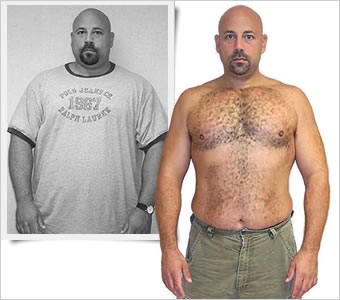100 Pounds Lost with LAP-BAND

Ric Potter of Fort Lauderdale can’t recall a time when he didn’t have weight problems. As a child, he was always the chubby one and as an adult, he grew tired of always being the biggest person in the room. “I think if one more person called me ‘Big Papa,’ I was going to lose it,” he says.
Ric, a 36-year-old nurse who exercised regularly since middle school, tried many diets. “I’d lose weight for a while, then become ravenously hungry, overeat and start to gain all the weight back,” he says. Eventually, he reached 330 pounds and could barely squeeze into an airplane seat. He also had developed sleep apnea, joint problems and high blood pressure and triglyceride levels. By the end of a 12-hour nursing shift, he was too tired to go to the gym or even drive home at times. “I was a heart attack waiting to happen,” he says.
Ric knew he needed help. In 2004, he learned that Thomas Bass, MD, bariatric specialist and surgeon on the medical staff at Memorial Regional Hospital, Memorial Regional Hospital South, Memorial Hospital Miramar and Memorial Hospital Pembroke, offered laparoscopic band surgery (LAP-BAND®). The reversible procedure involves inserting an inflatable band around the top portion of the stomach to create a small pouch that fills more quickly. Once the ring is adjusted – by injecting or removing saline via a port under the skin – optimal weight loss can be achieved.
Room to Spare
Ric underwent laparoscopic band surgery in October 2004. Soon after, he kicked his diet soda habit and replaced some of the carbs he loved so much with smaller portions of healthier foods. He is exercising again and has lost 100 pounds. With his pant size dropping from 54 to 36, he can shop in regular department stores and now fits into his airline seat with room to spare. “For me, just being a normal weight is a lot of fun,” Ric says.
Dr. Bass commends Ric’s commitment. “The difference between having a good result or a great result from surgery is how much you make exercise a regular part of your lifestyle,” says Dr. Bass. “There’s no doubt that Ric’s success is directly related to his commitment to the necessary dietary changes and his own personal exercise regimen.”
“I used to think that I were given 10 pounds of pasta, that’s what I should eat,” says Ric. “Although it’s almost impossible for an Italian like me, I had to get used to leaving food on my plate.” In addition, Ric shares that he is working out at the gym again, as well as walking, bike riding and doing yard work.
More importantly, his health issues have subsided. “I believe if I hadn’t gone to Dr. Bass, I’d have had a heart attack by now,” he says. “I think the lap band procedure saved my life.”

